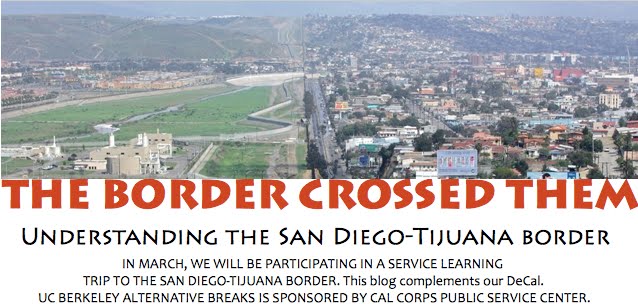
Tomorrow we embark on our last decal of the semester. Words cannot describe how amazing and rewarding this experience has been.
We will make scrapbooks in class and then we are happy to have HECTOR CARDENAS, from the Goldman School of Public Policy, come and give a talk about U.S. Mexico relations and the future of immigration reform. From the GSPP website:
While he was still in the PhD program, he started The Ergo Group, a policy and technology consulting firm that specializes in bringing the digital age to government agencies and thus helping them to do more and better things for more and more people. He has worked at The Ergo Group since 2000 on projects with the Mexican federal government and with state and local governments in the US. He is the president of the Silicon Valley chapter of the Mexico Talent Network and serves on the California Business Advisory Board of Nacional Financiera (Mexico’s development bank). He is back at GSPP to teach a course on US-Mexico relations.

Anyone interested in watching the film, LA MISSION, sometime soon? It comes out in theaters this Friday, and Benjamin Bratt wants us to go:
Dear Friends,
It is with great pride in the efforts of literally hundreds of people
that we write to tell you that our film La MISSION will have its
national theatrical release beginning April 9th.
La MISSION pays homage to the neighborhood and people we grew up around,
and captures the vibrancy, cultural pride, flavor a...nd sound of this
ever-evolving barrio. At the center of the story is Che, an old school
reformed bad boy and single father who has dedicated his life to raising
his 18 year-old son. Jess is a UCLA-bound honors student who is hiding
a deeply-held secret from his macho father: he's gay.
La MISSION doesn't pull any punches. It takes a hard look at some of the
prevailing attitudes that still thrive and do damage within our
communities. But La MISSION also celebrates the humor, the sense of
pride, and the passion for life that exists alongside the everyday
struggles.
Opening weekend attendance is critical. The box office totals determine
the life expectancy of the film, including its afterlife on DVD. If
you, as we do, want to see more films that are authentically
representative of our experiences and our communities, we urge you to
support independent filmmaking by showing up at the theaters and buying
tickets. It's the only message exhibitors understand--they only run
films that will bring in large crowds.
Please check our website (www.lamissionthemovie.com) and also become a fan of
La Mission on Facebook. There you will find details on what cities and
theaters we are playing in, plus photos and information on the film and
its crew.
Thanks for supporting independent cinema, and a heartfelt thanks from us
for your support of La MISSION.
Power to the people!
Peter and Benjamin




